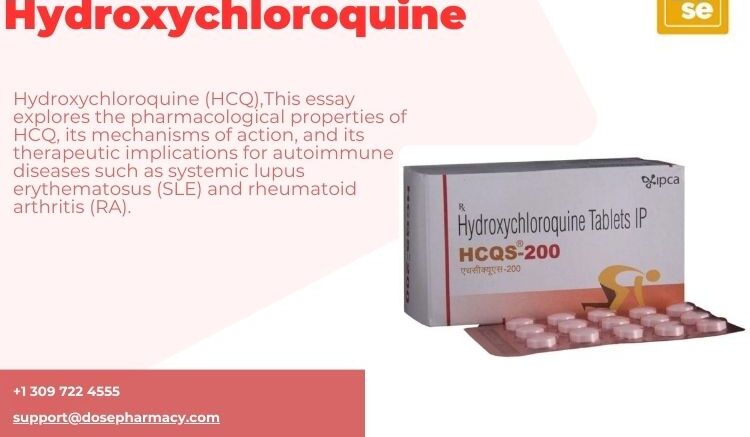In the realm of medicine, the repurposing of existing drugs for new therapeutic uses has become an increasingly explored avenue. Worm Infections Hydroxychloroquine, traditionally known for its role in treating malaria and certain autoimmune diseases like lupus and rheumatoid arthritis, has recently garnered attention for its potential in combating parasitic worm infections. This shift in focus represents a proactive approach to addressing neglected tropical diseases (NTDs) that affect millions worldwide, particularly in regions with limited healthcare resources. buy hydroxychloroquine online on Dosepharmacy.
Parasitic Worm Infections
Parasitic worms, or helminths, encompass a diverse group of organisms that can infect various tissues and organs in humans. These infections, prevalent in tropical and subtropical regions, often occur due to poor sanitation and limited access to clean water. The impact of these diseases extends beyond mere physical discomfort, contributing significantly to morbidity and hindering socio-economic development in affected communities.
The main types of parasitic worm infections include:
- Soil-transmitted helminths (STHs): Such as roundworm (Ascaris lumbricoides), whipworm (Trichuris trichiura), and hookworm (Necator americanus, Ancylostoma duodenale).
- Schistosomiasis: Caused by blood flukes of the genus Schistosoma, transmitted through contaminated freshwater.
- Lymphatic Filariasis: Caused by thread-like filarial worms transmitted by mosquitoes.
Each type presents unique challenges in terms of transmission, diagnosis, and treatment. Traditional approaches have relied on anthelmintic drugs like albendazole and mebendazole, which, while effective, may face challenges such as emerging resistance and logistical hurdles in distribution.
Hydroxychloroquine: Mechanism of Action and Potential
Hydroxychloroquine (HCQ) belongs to the class of 4-aminoquinoline compounds and is primarily used in the prevention and treatment of malaria. Its mechanism of action involves altering the pH within the intracellular organelles of parasites, thereby inhibiting essential processes like hemoglobin digestion and heme polymerization. This action not only affects malaria parasites (Plasmodium spp.) but also has implications for other intracellular pathogens, including certain types of helminths.
Recent studies have explored HCQ’s potential against helminthic infections based on its:
- Immunomodulatory Effects: HCQ can influence the immune response, potentially aiding in the control of parasitic infections where immune regulation plays a critical role.
- Direct Antiparasitic Effects: Similar to its action against malaria parasites, HCQ may interfere with essential metabolic pathways in certain helminths.
Clinical Evidence and Research Challenges
The exploration of HCQ for helminthic infections is still in its nascent stages, with limited clinical data available. Most studies have focused on in vitro and animal models, demonstrating varying degrees of efficacy against different species of worms. For instance, research has shown promising results against filarial worms in animal models, suggesting a potential for adjunct therapy in human cases.
Challenges in translating these findings into clinical practice include:
- Species-Specific Responses: Different helminth species may respond differently to HCQ, necessitating targeted research for each type of infection.
- Clinical Trial Design: Designing robust clinical trials to evaluate HCQ’s efficacy, safety, and optimal dosing in diverse populations poses logistical and ethical challenges.
- Combination Therapies: Considering HCQ’s potential as an adjunct therapy alongside existing treatments like albendazole or ivermectin requires careful consideration of drug interactions and synergistic effects.
Public Health Implications and Global Efforts
The global health community’s interest in repurposing HCQ for helminth infections stems from its affordability, oral availability, and established safety profile in diverse populations. This makes it a potentially valuable addition to the arsenal against NTDs, particularly in resource-constrained settings where alternative treatments may be limited or inaccessible.
Initiatives such as the World Health Organization’s (WHO) roadmap for NTDs emphasize the need for integrated approaches that leverage existing drugs like HCQ to achieve sustainable control and elimination goals. Collaborative efforts between researchers, healthcare providers, and policymakers are essential to advancing the evidence base and facilitating regulatory approvals for new indications.
Ethical Considerations and Community Engagement
As with any medical intervention, the ethical dimensions of repurposing HCQ for helminth infections warrant careful consideration. Issues such as informed consent, equitable access to treatment, and the involvement of affected communities in research are critical for ensuring responsible and culturally sensitive implementation.
Community engagement strategies should be prioritized:
- Education and Awareness: Providing clear information about the potential benefits and risks of HCQ treatment for helminths.
- Long-Term Monitoring: Establishing mechanisms for monitoring treatment outcomes and potential adverse effects in diverse populations.
Conclusion:
The exploration of hydroxychloroquine tablets for treating parasitic worm infections represents a promising frontier in global health. While challenges remain in terms of clinical validation and implementation, the potential benefits—such as improved treatment options, reduced morbidity, and enhanced disease control—are substantial.
Moving forward, concerted efforts are needed to expand the evidence base through rigorous research, foster international collaborations, and integrate HCQ into comprehensive NTD control programs. By leveraging existing resources and expertise, the global health community can work towards achieving sustainable impact and advancing health equity for populations affected by parasitic worm infections worldwide. Read More…..

Be the first to comment on "Hydroxychloroquine Tablets for Treating Parasitic Worm Infections"